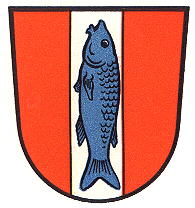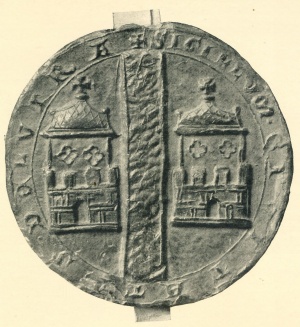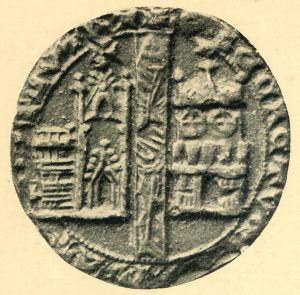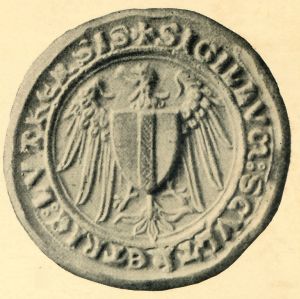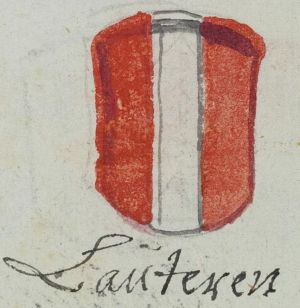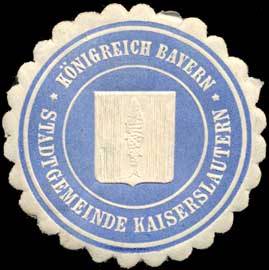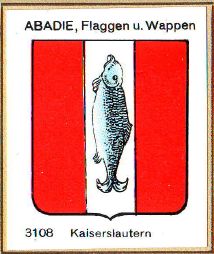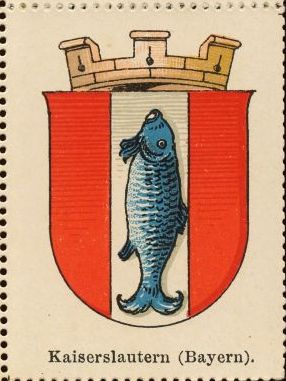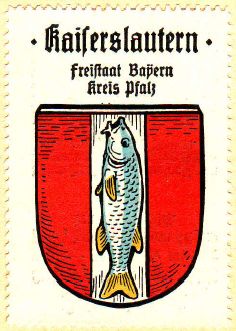Kaiserslautern: Difference between revisions
Knorrepoes (talk | contribs) m (Text replacement - "===Official blazon=== In" to "===Official blazon=== *(de) In") |
Knorrepoes (talk | contribs) |
||
| Line 27: | Line 27: | ||
|align="center"|[[File:kaiserslauternz4.jpg|center|Siegel von Kaiserslautern]] <br/>Seal from the 14th century | |align="center"|[[File:kaiserslauternz4.jpg|center|Siegel von Kaiserslautern]] <br/>Seal from the 14th century | ||
|align="center"|[[File:{{PAGENAME}}1530.jpg|center|Wappen von {{PAGENAME}}]] <br/>The arms in a manuscript +/- 1530 | |align="center"|[[File:{{PAGENAME}}1530.jpg|center|Wappen von {{PAGENAME}}]] <br/>The arms in a manuscript +/- 1530 | ||
|- | |||
|align="center"|[[File:{{PAGENAME}}16.jpg|center|300 px|Arms of {{PAGENAME}}]] <br/>The arms in a [[:Category:Windhag city arms|16th century manuscript]] | |||
|- | |- | ||
|align="center"|[[File:kaiserslauternz1.jpg|center|Seal of {{PAGENAME}}]] <br/>Seal from around 1900 | |align="center"|[[File:kaiserslauternz1.jpg|center|Seal of {{PAGENAME}}]] <br/>Seal from around 1900 | ||
Revision as of 07:25, 21 May 2021
This page is part of the German heraldry portal |
Heraldry of the World |
|
German heraldry:
|
Selected collector's items from Germany:
|
KAISERSLAUTERN
State : Rheinland-Pfalz
Urban district (Stadtkreis) : Kaiserslautern
Additions : 1969 Dansenberg, Erfenbach (1937 Stockborn), Erlenbach, Hohenecken, Mölschbach, Morlautern, Siegelbach
Official blazon
- (de) In Rot einen silbernen Pfahl, belegt mit einem steigenden blauen Fisch.
Origin/meaning
The arms were granted on August 3, 1842.
Kaiserslautern became a city already in the 12th century. The oldest seal is known since 1262 and shows a pale between two towers behind walls. The pale probably is the Lauter river, but can also be derived from the arms of the Lords of Hohenecken, who used a silver pale in red, flanked on each side by 5 golden billets.
In a seal from 1373 two fish are added on the pale, and one tower is transformed into a church. In the 17th century the buildings are removed and only one fish is shown, identical to the present arms.
The fish have not always been shown on the pale. In a roll of arms from 1530 the arms are as they are today, but without the fish.
Similarly, on another 14th century seal the arms, without fish, are placed on the breast of the imperial eagle. The colours are also not changed since the roll of arms in 1530, the oldest coloured image of the arms. Sometimes, however, the fish was shown in silver on a blue pale.
| Seal from 1266 |
Seal from 1373 |
| Seal from the 14th century |
The arms in a manuscript +/- 1530 |
| The arms in a 16th century manuscript | |
| Seal from around 1900 |
The arms in the Abadie albums |
| The arms in the Wappen-Sammlung (1900) |
The arms in the Kaffee Hag albums +/- 1925, with the fish in natural colours. |
There is another story about the origin of the fish :
In the year 1497 Prince Philipp had a huge fish served at a royal banquet in Heidelberg. The fish was 6m in length and weighed about 350 pounds. This fish was caught in the Kaiserwoog (imperial pond) in Lautern. The fish had a ring around its neck, stating that it was the first fish released in the pond on the 5th of October 1230 by emperor Frederic II. The fish thus was 267 years old at the time.
Contact and Support
Partners:
Your logo here ?
Contact us
© since 1995, Heraldry of the World, Ralf Hartemink 
Index of the site
Literature : Stadler, 1964-1971, 8 volumes.


